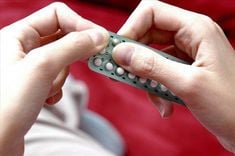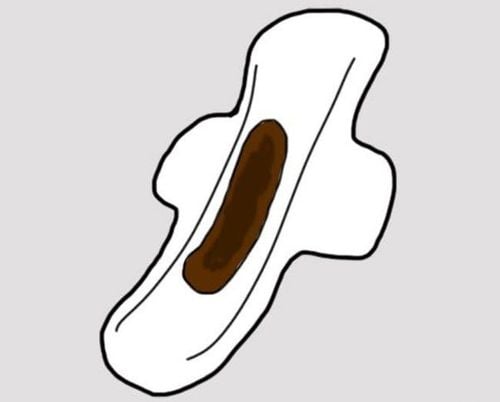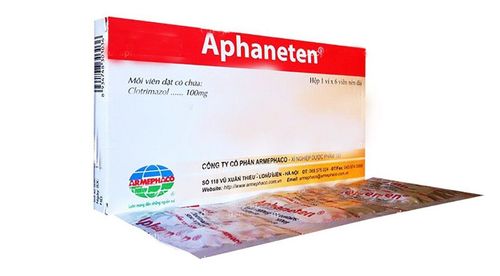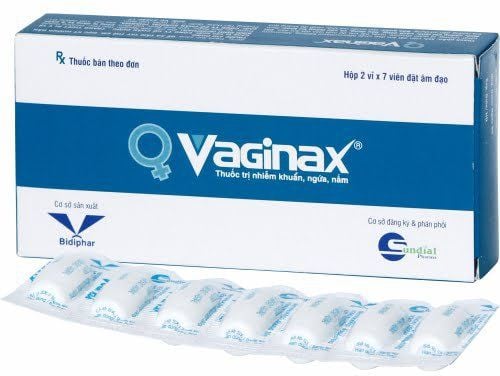This is an automatically translated article.
Vaginal pills are quite popular treatment method in recent times. The suppository is usually oval in shape and is inserted into the vagina using a plastic applicator. They will become liquid inside the vagina when they warm to body temperature, fast acting due to the rapid absorption rate of the medicine. Vaginal suppositories provide symptomatic relief of some conditions that affect the vagina, such as vaginitis. Therefore, the patient should pay attention to cleaning the intimate area before placing the drug to keep the drug effective and not aggravate the existing disease.
1. How to clean the private area before placing the medicine?
The intimate area is a sensitive area and has a high potential for infection. The external vaginal opening is located between the urinary opening and the anus, so bacteria can easily enter the vagina when the medicine is placed. Patients should pay attention to cleaning the area before applying the medicine at each use.
First, wash your hands with soap. Then, clean the intimate area with warm water and mild soap. If possible, consider choosing soaps specifically for sensitive skin areas such as the intimate area. Dry with a clean towel before starting to insert the medicine into the vagina.
Use the vaginal suppository by following these steps:
Take the medicine out of the package. Place the suppository on the end of the applicator. If an injection aid is not available, you may have to use your hands and skip this step. This is why it's important to remember to wash your hands before placing the medication. Hold the assist device at the other end that does not contain the injection. Prepare the pose: You can lie on your back with your knees bent, or you can stand with your knees bent and feet a few centimeters apart. If you are a caregiver, your patient or loved one should come first. Gently insert the device into the vagina as far as it can feel comfortable. If using the hand directly, the drug should be inserted deeper than 3 middle knuckles. Press the plunger of the assist tool as far as possible. This will push the suppository back into your vagina. Remove the applicator from the vagina. If the tool is reusable, clean it as directed by the instructions on the package. If it cannot be reused, throw it in the trash. Discard all other used materials. Wash hands immediately with soap and warm water. Some tips for vaginal suppositories:
It is best to use vaginal suppositories before going to bed. Lying down after placement will reduce drug leakage that can occur while sitting or standing. Wearing tampons will protect your underwear and bed sheets from leaking. People can use vaginal suppositories during menstruation. But they should use tampons instead of tampons because tampons can absorb some medications. A person should take the medication for the long term as directed, even if symptoms go away.

Vệ sinh vùng kín trước khi đặt thuốc giúp giảm nguy cơ vi khuẩn xâm nhập vào âm đạo
2. What are vaginal suppositories used for?
Vaginal suppositories can treat certain conditions, such as yeast vaginosis. Vaginal suppositories can help treat yeast infections and vaginal dryness. Birth control suppositories are another form of vaginal suppository that some people have used as a form of birth control. Suppositories will take a long time to work, depending on their purpose. The size and chemical composition of the suppository will also determine the dissolution rate of the suppository.
Contraception
Contraceptive suppositories containing spermicide work in two ways:
Creates a foam that blocks the entrance to the cervix so sperm cannot get through. Immobilizes and kills sperm, so they can't travel to the uterus to meet an egg. People should insert the suppository into the vagina at least 10 minutes before having sex. This gives enough time for the drug to melt, allowing the spermicide to disperse. According to Planned Parenthood, 18% of women who use birth control pills will get pregnant each year, even if they use it correctly. With improper use, this number can be as high as 28 percent.
Yeast vaginitis
Vaginal yeast infection, also known as vaginal candidiasis, is a common condition. Infection occurs due to the organism Candida albicans. People can treat vaginal yeast infections with both over-the-counter (OTC) suppositories and natural suppositories.
Over-the-counter suppositories Some antifungal medications are available as creams and suppositories, such as clotrimazole and miconazole. They come in different strengths and are available for purchase over the counter. Depending on the strength, it can usually take 3 to 7 days to work and clear an existing infection.
Suppositories usually require less dosage than creams and tend to relieve symptoms earlier. Your doctor may prescribe a 14-day vaginal suppository for more severe or complicated yeast infections. When using vaginal suppositories for yeast vaginitis, it is essential to complete the recommended course of treatment even if symptoms disappear before the medication is gone.
Natural Suppositories For decades, people have used boric acid suppositories as an alternative treatment for recurrent fungal vaginitis. These are also available over the counter at most health stores and online stores. A 2011 review article investigated the effectiveness of boric acid in the treatment of recurrent vaginal candidiasis. Across 14 studies, the number of women being cured ranged from 40 to 100 percent. A more recent 2018 lab study found that boric acid works by limiting the growth of strains of Candida albicans and Candida glabrata that have become resistant to conventional drug treatment. Boric acid suppositories may be especially helpful for people whose symptoms of vaginal candidiasis do not improve after a prolonged course of conventional treatment.
Vaginal dryness
Vaginal dryness can affect people of all ages but is more common in people transitioning to menopause. Certain suppositories can help maintain vaginal moisture and pH levels within a healthy range.
Hormonal suppositories
Hormonal suppositories can help treat vaginal dryness. A recent clinical trial suggests that hormonal suppositories can be an effective treatment for vaginal dryness, especially in women who cannot take Hormone Replacement Therapy (HRT). For 12 weeks, 325 women took a hormone supplement called Prasterone, and 157 women took a placebo. At the end of 12 weeks, the women taking the pill had significantly improved vaginal dryness compared with those taking the placebo. Prasterone also acts locally in vaginal cells, so there are few side effects.
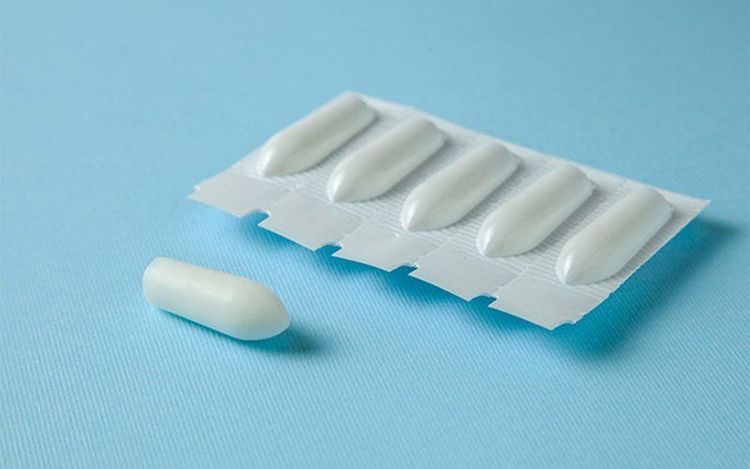
Thuốc đặt âm đạo giúp giảm nhẹ triệu chứng một số các bệnh như viêm âm đạo do nấm
Vitamin E suppositories
Another recent study found that a 12-week course of vitamin E suppositories may be beneficial for treating vaginal dryness and other symptoms of vaginal atrophy. One small study compared the effectiveness of a vitamin E suppository and a vaginal cream containing the hormone estrogen in 52 women. Both treatments significantly improved symptoms after 4 weeks, although estrogen creams were most effective. But vitamin E may work more slowly than estrogen cream because there isn't a significant difference between the two treatments at weeks 8 and 12. For women who are sensitive to hormone therapy, vitamin suppositories E might be a more suitable and secure alternative.
3. Summary
Vaginal pills for contraception tend to be less effective than other conventional methods of birth control.
However, vaginal suppositories to treat yeast infections and vaginal dryness are generally considered safe and effective. In many cases, they can also provide faster and more targeted pain relief than oral medications, with fewer side effects.
Using vaginal suppositories is quite simple and causes little discomfort. In particular, the hygiene of the private area before placing the drug should be remembered to perform regularly at every use. Keep the intimate area clean to promote the effect of the suppository and prevent the disease from getting worse.
Basic gynecological examination and screening package at Vinmec International General Hospital for customers with abnormal symptoms such as: Abnormal vaginal bleeding; Menstrual problems; Abnormal vaginal discharge (with a bad smell, a different color than usual); Vaginal pain and itching....Female customers have several risk factors such as poor personal hygiene, unsafe sex, abortion, ..Female customers have other symptoms of infection ...
When registering for the basic gynecological examination and screening package at Vinmec, you can perform ultrasound techniques and examination to detect inflammatory diseases early for easy treatment, without costly; Screening for early detection of gynecological cancer.
Please dial HOTLINE for more information or register for an appointment HERE. Download MyVinmec app to make appointments faster and to manage your bookings easily.



